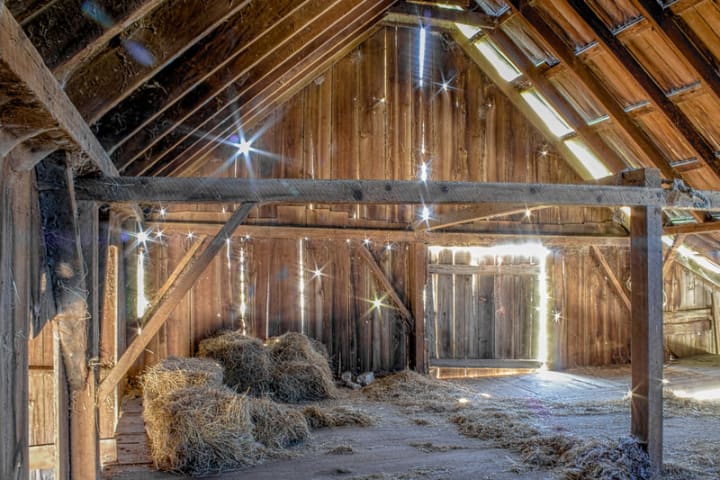The Barn on Bolton Road
My friend's arrival up the hill was a point of departure.

My family wasn’t rich but we had a roomy old house that my parents bought for next to nothing on one of Elmford’s nicest streets, so my classmates lumped me in with the wealthy kids. Our home had been a carriage house in the 1800s, for what had once been the manor house up the hill on Bolton Road, the dead-end street to the side of our corner lot.
Bolton ended in a cul-de-sac, which was next to the Keller’s place, an old stable that had been converted into a six-bedroom house—not exactly a mansion by Elmsford standards, but pretty close. It was U-shaped with several peaked gables and a little cupola with a weathervane on top that you could see from the bottom of the hill. Everyone who saw it admired the arch-shaped picture windows and its white rounded shingles, but what I loved most was the old red barn that was set off to the side, so faded and worn it looked pink in places, and the little pasture next to it where the Kellers kept their two horses, Butterscotch and Agatha.
My favorite part about living in my house when I was a kid was that I got to see Butterscotch and Agatha every day after school. Mrs. Keller, an empty-nester who had thick, straight black hair that she pushed back with a ribbon-covered hair band, groomed them herself and showed me how to brush them. Butterscotch was dapple grey, and Agatha was chestnut. I loved how they would snort or nicker when I would come by with carrots or sugar cubes, and I felt happy when they’d rest their heads on my shoulder. My favorite thing was when they would smile their goofy smiles, teeth exposed, like they were laughing with me as I told them about my day.
When I was in ninth grade, Mrs. Keller first broke the news to my mom that Mr. Keller had taken a job in Boston, and how devastated she was to be selling her home. She was going to take Butterscotch with them and board her at a Massachusetts horse farm not far away, but she felt that Agatha, who had grown thin and rickety at 29 years old, wouldn’t survive the trip in a trailer. She was heartbroken to leave her and just wanted the old girl to live out the rest of her life peacefully in her forever-home. And so, she had struck a deal with the new buyers: they could have Agatha if they promised to hire an onsite stablehand to look after her.
I also felt sad that the Kellers were moving and taking Butterscotch, but my dismay was lessened when I learned that new buyers were the parents of my good friend, Betsy Pemberton. I was excited for Betsy to become my neighbor, but wary of her mother’s hot-and-cold ways, her harsh and sometimes cruel behavior. Betsy was a beautiful, strawberry blond girl with a kind-looking freckled face, but her mother was always telling her that she looked fat or that her jaw was too wide, comments that stunned all of Betsy’s friends even as little kids. Betsy was slender. Mrs. Pemberton herself was slightly pudgy, with frosted hair and an undefined chin.
In high school, Betsy had adopted the habit of responding to any question asked of her by adults with the lead, “I’m not quite sure, but…” I was positive it was an unconscious reaction to her mother’s insistance that it was a man’s world, and Betsy’s feeling that she couldn’t possibly know the right answer, or should pretend not to.
As soon as Betsy moved in, she made it clear to all of us that her mother was gut-renovating the house and no one would be allowed in until it was all finished. Betsy had no idea when this would be, but she seemed resigned to thinking this followed some kind of acceptable logic. We literally were not permitted to step foot in the house.
It seemed weird to me at first that the the Pembertons would buy this property, even though I was glad they did. It was too cool and quirky— I would have expected Mrs. Pemberton to want something more stately and refined, maybe with big columns out front and a grand front hallway. Betsy told me they bought it because it was a good investment since they could get a tax write-off for it being a farm with a horse. I had never heard of this before.
Since they were keeping Agatha, the Pembertons hired Neil, a 27-year-old stablehand, who moved into the little studio apartment connected to the barn. Neil was from rural western Pennsylvania originally, but over several years had embraced Elmsford, which was a mile from the ocean, and he kept a surfboard in the barn. He had chin-length, wavy brown hair, stubble on his face, and he exuded a sense of calm. I liked him for showering Agatha with love, especially since I was feeling guilty for not coming to visit her more. But I didn’t feel comfortable just swinging by now that the Pembertons were there, even though I had been friends with Betsy for almost forever.

Betsy got married in Charleston when we were 25, at one of her family’s several homes. They had rented a nearby cottage for all of the bridesmaids and me to stay in. I was not a bridesmaid and I didn’t know any of the other guests. But something the bridesmaids talked about stayed with me always: that Betsy’s mother wouldn’t ever let anyone into one of her houses while she was renovating because she didn’t want anyone to “know what she had.”
“What do you mean—like exotic pets?” I asked quizzically. “Or a dungeon or something?”
“No,” the maid of honor answered as though she were speaking to a small child. “How much money she has.”
I was baffled and couldn’t hide it. My best guess was that Mrs. Pemberton liked to use the strapped-for-cash excuse as her fallback…but for what? And then I remembered Thanksgiving, when Betsy had joined my family for the holiday in tenth grade.
In April of our freshman year, we were partners for a history project, where we had to create a skit explaining the Electoral College. Betsy had to babysit her mop-headed younger brother, Charlie, who was in fifth grade. The plan was to work on our project in the barn while Charlie did his homework in there. Agatha was in her stall, and I was grateful to be able to stroke her brown neck as we brainstormed ideas. There was a hay loft and three stalls, two of them empty. The floor was strewn with hay, and a few small bales were stacked outside Agatha’s stall, which we used as makeshift desks to plan our project. Betsy scribbled furiously in her notebook, and Charlie, having finished his homework, was out in the pasture kicking a soccer ball.

My hand was on Agatha’s neck as Mrs. Pemberton came through the door. My heart sank; I thought I would get away without seeing her that day. She seemed to not even see me as she started speaking. She had the kind of proper mid-Atlantic diction used in classic movies from the 1950s, where they said their Ws as if trying to emulate the sound of the wind.
“Elizabeth, I don’t know how to say this,” she began in a remote tone, as though it were only a projection of her speaking, her voice quivering. “Your father had an MRI today,” she continued. I stroked Agatha’s neck faster.
“They injected a dye into his veins, and he had a fatal allergic reaction to it. He’s no longer with us.” Her voice cracked and she began to cry softly, holding a tissue to her eyes. “It will be best for everyone if you continue your education at boarding school. I have arranged for you to have a phone interview at a fine girl’s school in New Hampshire on Friday. I plan to switch residences shortly.”
My brain tried to calibrate to all of these words she was saying; they did not fit together. MRI…no longer with…boarding school…fatal…dye?
Betsy’s body started heaving before the sound came, the anguished wail of her sobbing. I rushed over to hug her, kneeling on the floor with hay etching itself into my knees. Her body shook.
“It’s time for you to leave,” Mrs. Pemberton declared quietly to the air, sobbing into her tissue. I hugged Betsy tighter for a few minutes, before taking her hand and lifting us both to our feet. I led her to her mother, who finally put her arms around Betsy while they both cried.
“I’m so sorry,” I said. Through their sobs, I slipped out the door and began crying myself, Charlie off in the distance.
Mrs. Pemberton kept the house on Bolton Road, but moved to Charleston at the end of the school year, and she did, indeed, send Betsy off to the Faraday School in New Hampshire for tenth grade. When November rolled around, Betsy sent me a letter and asked if she could join our family for Thanksgiving. Her mother had suggested it, she said, because she could not afford the plane ticket to South Carolina.
“So sad,” my mother responded, shaking her head when I told her. “Of course she can afford it. But it will be wonderful to see Betsy.”
Betsy flew down the weekend before Thanksgiving and came to school with me. All of our classmates and teachers were excited to see her, and she was grateful for the real connection. She thought Faraday was alright, but she wasn’t really getting involved in anything or making good friends. I asked her how she was doing with the loss of her dad, and she told me that the week he died, they had watched a movie together, and that there was an embarrassing joke about sex that had made him crack up. She had never seen him break character that. And she told me that he spoke to her through dreams. She said her mom had told her that it was too much to talk about yet.
“Let’s go see Agatha,” Betsy said after school on that Monday.
“Is that a good idea?” I asked.
“I have to,” she answered.
As we approached the barn and Betsy’s old house, which her mother still owned, I was flooded with memories of our last time together there.
“You’re sure about this?” I asked.
“Yes,” she responded resolutely.
As I walked through the barn door, I knew something was wrong. Agatha was not there and she wasn’t in the pasture. Betsy looked pale.
“Neil!” I yelled, hoping he was in his studio. In a moment he came running into the barn, aguish on his face.
“I was hoping your mom had reached you,” he said mournfully to Betsy, his face crumbling. “I’m so sorry. Yesterday morning...”
I looked down at the bales that were lined up outside Agatha’s stall. Betsy’s notebook was still there from our skit-planning session the past spring. A pen rested on top, horse doodles adorning the open page, a surge of rhythmic swirls filling up the empty spaces.
About the Creator
Kim Sillen
Kim Sillen is an artist, activist and graphic designer who lives on the Lower East Side of Manhattan. She is interested in the role art and design can play in influencing public policy by mobilizing communities.






Comments
There are no comments for this story
Be the first to respond and start the conversation.